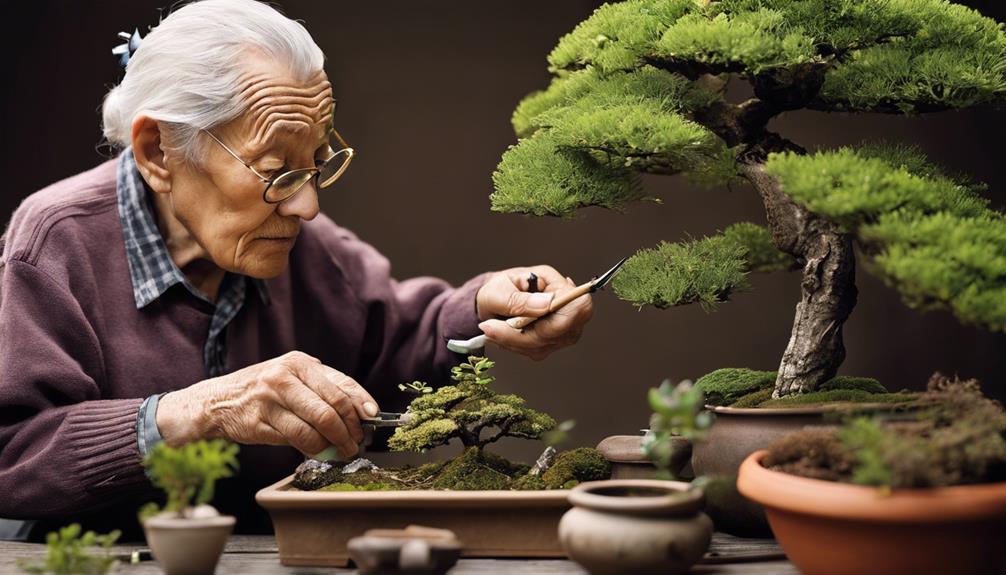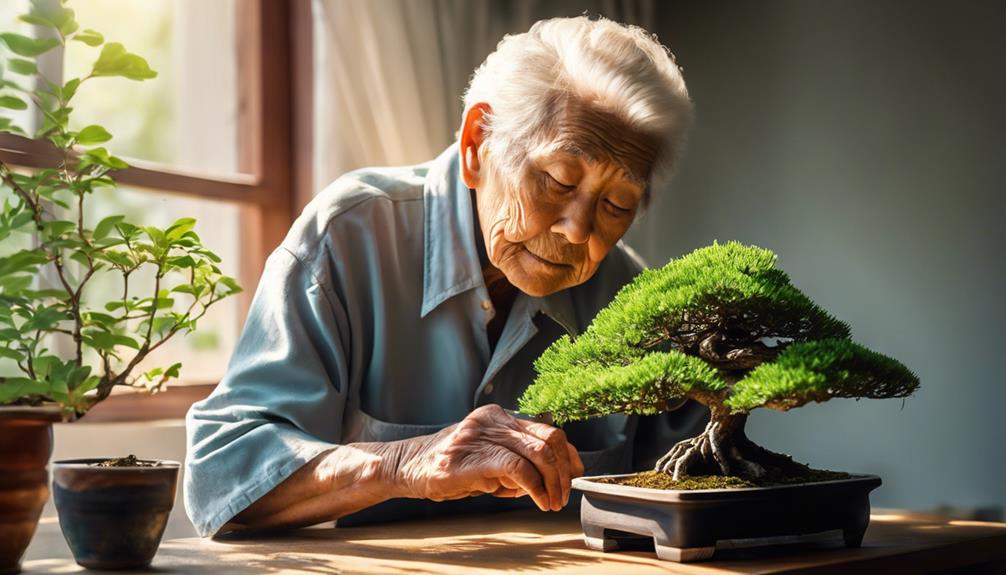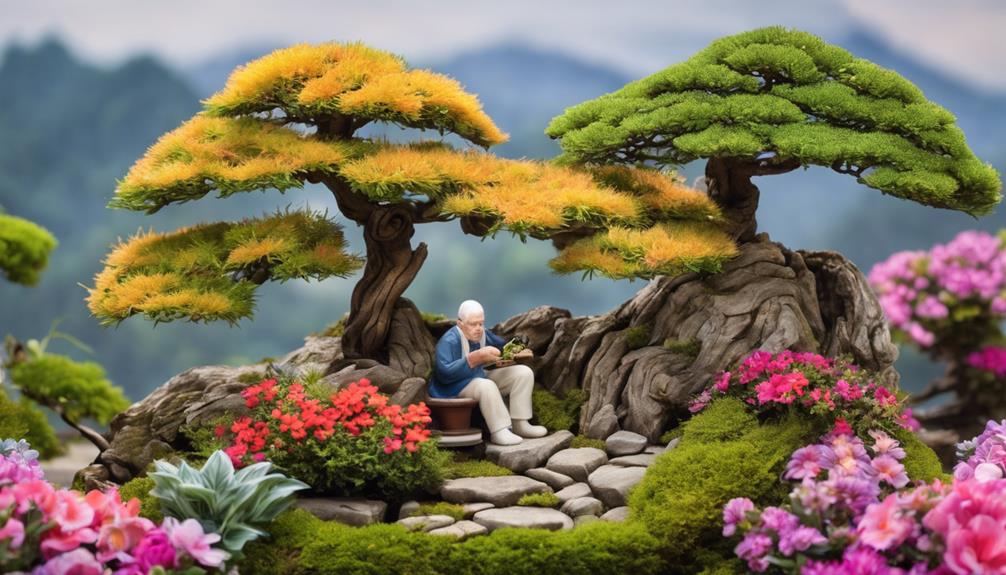Did you realize that caring for bonsai trees could potentially unlock a secret to assisting older adults in fighting dementia? The detailed process of nurturing these small marvels extends beyond their visual beauty, providing a range of mental and emotional advantages for seniors.
But how exactly can the simple act of tending to these small trees have such a profound impact on mental health and memory retention in seniors? Let's explore the fascinating link between bonsai tree cultivation and dementia prevention, shedding light on the therapeutic potential of this age-old practice.
Key Takeaways
- Bonsai care boosts cognitive function and emotional well-being in seniors.
- Engaging with bonsai trees reduces stress, anxiety, and risk of dementia.
- Nature's impact on mental health includes dementia prevention through bonsai.
- Bonsai cultivation offers therapeutic benefits promoting cognitive health in seniors.
Benefits of Bonsai Tree Cultivation
Engaging in bonsai tree cultivation offers seniors a meditative and fulfilling activity that nurtures their cognitive function and emotional well-being. The art of tending to these miniature trees not only connects older adults with nature but also provides numerous health benefits. Research suggests that activities like caring for bonsai trees can potentially reduce the risk of Alzheimer's disease and other forms of dementia. The process of nurturing these delicate plants requires focus, attention to detail, and memory recall, all of which stimulate cognitive function and memory retention in seniors.
Moreover, the sense of purpose and accomplishment that comes with successfully growing bonsai trees can greatly enhance emotional well-being and mental clarity. The therapeutic nature of bonsai cultivation offers seniors a calming outlet to relieve stress and anxiety, promoting overall psychological health. By incorporating bonsai tree cultivation into their routine, older adults can experience not only the joy of nurturing life but also the profound benefits of connecting with nature on a deeper level.
Cognitive Stimulation Through Gardening

Transitioning from the benefits of bonsai tree cultivation, we explore how gardening activities, such as growing bonsai trees, can offer valuable cognitive stimulation for seniors. Engaging in caring for bonsai trees can be a rewarding experience for seniors, providing not just a beautiful hobby but also promoting mental acuity and sharpness. Here are three ways in which bonsai tree cultivation can benefit seniors in terms of cognitive stimulation:
- Memory Improvement: The attention to detail required in bonsai tree care tasks can help seniors enhance their memory skills, keeping their minds active and engaged.
- Enhanced Focus: Tending to the intricate needs of bonsai trees demands focus and concentration, which can aid seniors in maintaining and improving their ability to concentrate.
- Problem-Solving Skills: The complex nature of bonsai tree care encourages seniors to think critically, make decisions, and solve problems, thus stimulating their cognitive functions and keeping their minds sharp and agile.
Therapeutic Effects of Bonsai Trees
Utilizing the calming practice of pruning and shaping miniature trees, bonsai trees offer therapeutic benefits that can enhance cognitive function and emotional well-being, particularly for seniors. Engaging with bonsai trees has been linked to improved cognitive function and memory retention in seniors, providing a stimulating activity that exercises the mind.
The art of caring for these tiny trees encourages focus, mindfulness, and emotional well-being, promoting a sense of accomplishment and purpose. Moreover, bonsai therapy has shown promise in reducing stress, anxiety, and symptoms of depression, offering a natural way to alleviate emotional distress.
Connection Between Nature and Mental Health

Immersing ourselves in natural environments can significantly benefit our mental well-being, especially as we age. The connection between nature and mental health is profound, with exposure to green spaces proving to be a powerful tool in maintaining cognitive function and emotional stability. Here are three key ways in which nature influences mental health:
- Alzheimer's Disease Prevention: Studies have shown that regular contact with nature can help reduce the risk of developing Alzheimer's disease in seniors. Nature serves as a therapeutic environment that can protect against cognitive decline and memory loss.
- Physical Activity: Being in natural surroundings encourages physical activity, which is essential for overall well-being. Whether it's a leisurely walk in the park or gardening in the backyard, staying active outdoors can improve both physical and mental health.
- Stress Reduction: Proximity to green spaces has been linked to lower stress levels in seniors. The calming effect of nature can alleviate anxiety, promote relaxation, and contribute to a sense of peace and tranquility, all of which are crucial for maintaining mental health in older adults.
Bonsai Trees as Dementia Prevention Strategy

Engaging in bonsai tree care offers seniors a proactive approach to reducing the risk of dementia by providing sensory stimulation and enjoyable activities that support cognitive function and memory maintenance. Studies suggest that the act of nurturing bonsai trees can decrease the likelihood of developing dementia by 36%, making it a valuable dementia prevention strategy. Bonsai therapy not only allows seniors with Alzheimer's and dementia to engage in meaningful activities but also helps them maintain cognitive function and memory. By immersing themselves in the art of bonsai cultivation, seniors can proactively work towards preserving their mental well-being.
The sensory stimulation provided by bonsai trees is crucial for reducing the risk of dementia, as it keeps the mind active and engaged. The process of tending to these miniature trees offers a therapeutic outlet that promotes cognitive function and memory retention. Through bonsai care, seniors can find joy in nurturing life and connecting with nature, creating a sense of purpose that contributes to their overall mental well-being.
Frequently Asked Questions
Are Bonsai Trees Good for Mental Health?
Bonsai trees are indeed beneficial for mental health. They provide a sense of calm, creativity, and accomplishment. Engaging in bonsai cultivation can reduce stress levels and boost mood through caring for a living plant.
The meditative practice of tending to bonsai offers cognitive stimulation and emotional well-being. Seniors can benefit greatly from the artistic and therapeutic aspects of bonsai cultivation, fostering a connection to nature that contributes to mental wellness.
What Is so Special About a Bonsai Tree?
Bonsai trees are truly special due to their intricate beauty and symbolism. These miniature trees embody harmony, balance, and patience, capturing the essence of nature in a confined space.
The meticulous care required to nurture bonsai trees, such as pruning and shaping, fosters a deep connection with the natural world. The art of bonsai, originating centuries ago in China and Japan, offers a therapeutic and meditative practice that enriches our lives.
What Is the Bonsai Effect?
The Bonsai Effect refers to the positive impact that cultivating and caring for bonsai trees can have on individuals. Engaging with bonsai trees can enhance cognitive functions, promote mindfulness, and cultivate a sense of accomplishment.
It's a therapeutic practice that can reduce stress levels and improve overall well-being. The Bonsai Effect showcases how nurturing plants like bonsai can contribute to maintaining cognitive health and potentially preventing dementia.
What Does a Bonsai Tree Represent?
Bonsai trees are like miniature reflections of nature's grandeur, embodying patience, resilience, and the beauty found in imperfection. They symbolize harmony, balance, and tranquility, mirroring Japanese culture's reverence for nature.
Each bonsai tells a unique story, showcasing the grower's dedication and skill over time. The art of bonsai deepens our connection with nature, fostering mindfulness and appreciation for the natural world.
Conclusion
In conclusion, nurturing bonsai trees can be a fulfilling and therapeutic activity for seniors, offering cognitive stimulation and potential dementia prevention benefits.
While some may doubt the effectiveness of gardening in preventing dementia, the joy and sense of accomplishment that comes from caring for bonsai trees can truly make a difference in maintaining mental acuity.
Let's embrace the beauty of nature and the power it has in enhancing our overall well-being.









